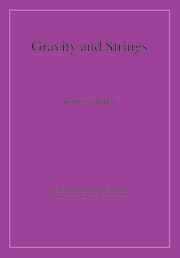Book contents
- Frontmatter
- Contents
- Preface
- Part I Introduction to gravity and supergravity
- Part II Gravitating point-particles
- 7 The Schwarzschild black hole
- 8 The Reissner–Nordström black hole
- 9 The Taub–NUT solution
- 10 Gravitational pp-waves
- 11 The Kaluza–Klein black hole
- 12 Dilaton and dilaton/axion black holes
- 13 Unbroken supersymmetry
- Part III Gravitating extended objects of string theory
- Appendix A Lie groups, symmetric spaces, and Yang–Mills fields
- Appendix B Gamma matrices and spinors
- Appendix C n-Spheres
- Appendix D Palatini's identity
- Appendix E Conformal rescalings
- Appendix F Connections and curvature components
- Appendix G The harmonic operator on ℝ3 × S1
- References
- Index
9 - The Taub–NUT solution
Published online by Cambridge University Press: 20 February 2010
- Frontmatter
- Contents
- Preface
- Part I Introduction to gravity and supergravity
- Part II Gravitating point-particles
- 7 The Schwarzschild black hole
- 8 The Reissner–Nordström black hole
- 9 The Taub–NUT solution
- 10 Gravitational pp-waves
- 11 The Kaluza–Klein black hole
- 12 Dilaton and dilaton/axion black holes
- 13 Unbroken supersymmetry
- Part III Gravitating extended objects of string theory
- Appendix A Lie groups, symmetric spaces, and Yang–Mills fields
- Appendix B Gamma matrices and spinors
- Appendix C n-Spheres
- Appendix D Palatini's identity
- Appendix E Conformal rescalings
- Appendix F Connections and curvature components
- Appendix G The harmonic operator on ℝ3 × S1
- References
- Index
Summary
The asymptotically flat, static, spherically symmetric Schwarzschild and RN BH solutions that we have studied in the two previous chapters were the only solutions of the Einstein and Einstein–Maxwell equations with those properties. To find more solutions, we have to relax these conditions or couple to gravity more general types of matter, as we will do later on. If we stay with the Einstein(–Maxwell) theory, one possibility is to look for static, axially symmetric solutions and another possibility is to relax the condition of staticity and only ask that the solution be stationary, which implies that we have to relax the condition of spherical symmetry as well and look for stationary, axisymmetric spacetimes. In the first case one finds solutions like those in Weyl's family [949, 950] which can be interpreted as describing the gravitational fields of axisymmetric sources with arbitrary multipole momenta or Melvin's solution [692] (which has cylindrical symmetry and was constructed earlier by Bonnor [165] via a Harrison transformation [499] of the vacuum), among many others. In the second case, we find the Kerr–Newman BHs [617, 723] with angular momentum and electric or magnetic charge and also the Taub–Newman–Unti–Tambourino (Taub–NUT) solution [724, 879], which may but need not include charges. The Taub–NUT metric does not describe a BH because it is not asymptotically flat. In fact, the only stationary axially symmetric BHs of the Einstein–Maxwell theory belong to the Kerr–Newman family of solutions (see e.g. [532, 533]).
The Taub–NUT solution has a number of features that are particularly interesting for us, which we are going to discuss in this chapter.
- Type
- Chapter
- Information
- Gravity and Strings , pp. 267 - 281Publisher: Cambridge University PressPrint publication year: 2004

